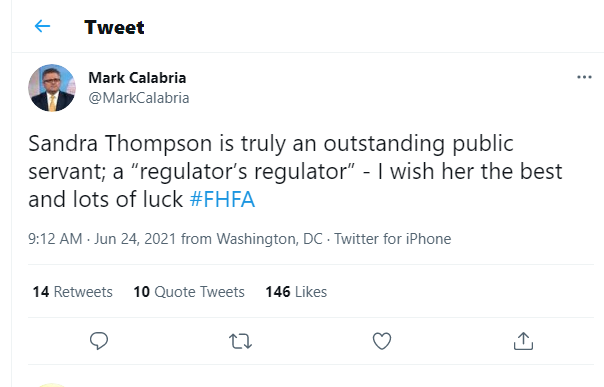
The great Sam Cooke may have written his classic song “A Change Is Gonna Come” in 1964, but it is just as accurate today for housing affairs.
This issue of Capital Commentary looks at changes coming … at the Federal Housing Finance Agency (FHFA), in housing demographics and urban neighborhoods. In housing matters, things are no more permanent than a sandcastle built along the shoreline.
1. Changing Leadership, Changing Priorities?
Last month’s Supreme Court ruling that the President could fire the Director of the Federal Housing Finance Agency “at will” brought immediate changes to the helm of the regulator for Fannie Mae, Freddie Mac and the 11 Federal Home Loan Bank Boards.
Here’s betting FHFA’s priorities are changing, too.
The same day the high court announced its decision in Collins v. Yellen, President Joe Biden fired Mark Calabria. His replacement as Acting Director is Sandra Thompson, who served as Deputy Director for Housing Mission and Goals at FHFA since 2013. Previously, Thompson worked at the FDIC for 23 years, including many in risk-management roles.
Her appointment was greeted warmly, even by her predecessor.

Sandra Thompson

In her first public address, Thompson hinted that the focus of the FHFA will tilt from ending conservatorship to growing homeownership.
“Throughout my career as a financial regulator, I’ve said that safety and soundness and access to credit are not mutually exclusive and shouldn’t be thought of that way,” she told attendees at an FHFA Virtual Listening Session on “Closing the Gap to Sustainable Homeownership.”
Thompson expressed dismay that “years of progress in closing the racial homeownership and wealth gap were erased” by lenders making “unsustainable” and “suspect” loans to borrowers in the financial crisis a dozen years ago. She emphasized that expanding access to credit is not the same as irresponsible lending.
FHFA provided two more clues that significant change is afoot at the agency:
- A statement was issued on July 1 on its commitment to “comprehensive” fair lending oversight by issuing “guidelines [that] will provide a foundation for expanding FHFA’s fair lending practices.”
- A 50 basis point Adverse Market Fee associated with most of the refinance loans purchased by the GSEs is being eliminated as of Aug, 1. The charge, which generally increased the cost of refinances by 0.1%, was cheered by a wide array of industry participants and housing advocates.
While Thompson will serve as Acting Director until Biden formally nominates — and the Senate confirms — a replacement, don’t expect her tenure to be short-lived.
Thompson has more extensive experience as a financial regulator than any of her predecessors and she is the first woman to head the agency. Those are two attributes the administration is likely to find politically appealing in building support for its housing policies.
2. “Congrats on the New Job; and If I May …”
In her first weeks on the job, Thompson figures to get plenty of cards and letters from housing industry interest groups and community advocates. Congratulations are certainly in order, but she can anticipate a few requests, too.
- The Community Home Lenders Association (CHLA) wasted no time sending a letter to Thompson and Treasury Secretary Janet Yellen seeking an immediate suspension to Preferred Stock Purchase Agreement (PSPA) amendments that placed restrictions on the type and amount of loans the GSEs could purchase. CHLA specifically cited limitations on so-called high-risk loans and loans backed by investor or second-home properties.
- Credit risk transfer (CRT) advocates such as the Housing Policy Council and Reinsurance Association of America may urge FHFA to revise GSE capital requirements to incent, rather than discourage, CRT transactions.
- Housing advocates may seek elimination of loan-level pricing adjustments (LLPAs) at Fannie Mae and Freddie Mac. The GSEs use LLPAs to price loans according to their risk.
If FHFA is determined to steer Fannie and Freddie toward more purchases of affordable loans, one potential change would be lifting the new PSPA caps on high-risk loans. The new amendment defines high-risk loans as a loan with any two of three attributes:
- A loan-to-value ratio of 90% or above.
- A debt-to-income ratio above 45%.
- A credit score below 680.
Currently, GSE annual purchases can contain no more than 6% of high-risk purchase loans and 3% of high-risk refinanced loans.
3. Demographics and Housing Demand
Two interesting demographic trends will significantly impact the quantity and location of housing in the future, according to the latest State of the Nation’s Housing report issued annually by the Joint Center for Housing Studies at Harvard University:
- The nation’s homebuilders desperately need immigrant labor to construct homes needed now to meet current demand. Experts suggest the country is at least 3–5 million housing units short of housing equilibrium.
- According to the National Association of Home Builders, the share of immigrants in construction trades nationally is 30%. The figure is much higher in California and Texas: 42% and 41%, respectively.
A majority of those foreign workers are from Mexico and an improving economy in that country is helping to stem the tide of its citizens into the U.S., as I was told recently by Chris Herbert, Managing Director of the Joint Center. Herbert is an upcoming guest on the Arch MI PolicyCast video podcast.
4. Would You Like Fries with That House?

If so, you’re probably out of luck if you are buying a home in Center City Philadelphia.
The Philadelphia Inquirer reports that the City of Brotherly Love’s fast-food joints are rapidly closing shop and are now outnumbered by, ahem, other joints: medical marijuana dispensaries.
“Five of the six McDonald’s locations in Philadelphia’s core have turned off their griddles and shut their doors … Two Wendy’s, one Checkers, and the sprawling Burger King at the busy Eighth and Market transit hub have all met the same fate.”
Why the exodus? The hunger for housing exceeds that for burgers and fries.
“Center City’s real estate has finally become too valuable to waste on one-story buildings,” reports the Inquirer.
- Say goodbye to Wendy’s and hello to a slim, 24-story residential tower,” reports the Inquirer.
- Expect new homes to replace an “iconic, stand-alone” McDonald’s on South Broad Street and the Checkers site at Broad and Girard, too.
All in all, it is good news.
The Inquirer notes: “The disappearance of such low-rent businesses can be seen as a measure of urban health, as well as healthier eating habits.”
5. Contest #10: A Sandcastle Is a House, Right?

Since we initiated the Capital Commentary Contest at the first of the year, housing trivia has been our dominant theme. For Contest #10, it still is but with a twist. After all, it’s summer when a man’s (or woman’s) home is their (sand)castle.
Take the quiz (two-part answer):
- What is the world record for the tallest sandcastle?
- Where was it built? (Hint: probably not where you’d think it would be!)
Email your answers to [email protected] by midnight July 30. All correct entries will be entered into a random drawing for an Arch MI Capital Commentary/PolicyCast mug and saucer. And, related to summer, Capital Commentary will be taking an extended hiatus of its own, returning in September.

Do you think Capital Commentary offers valuable information on housing policy and its potential impacts? If you do, share your comments with us. Your feedback will help ensure Capital Commentary covers the stories that have the most impact on your business.

About Arch MI’s Capital Commentary
Capital Commentary newsletter reports on the public policy issues shaping the housing industry’s future. Each issue presents insights from a team led by Kirk Willison.
About Arch MI’s PolicyCast
PolicyCast — a video podcast series hosted by Kirk Willison — enables mortgage professionals to keep on top of the issues shaping the future of housing and the new policy initiatives under consideration in Washington, D.C., the state capitals and the financial markets.
Stay Updated
Sign up to receive notifications of new Arch MI PolicyCast videos and Capital Commentary newsletters.